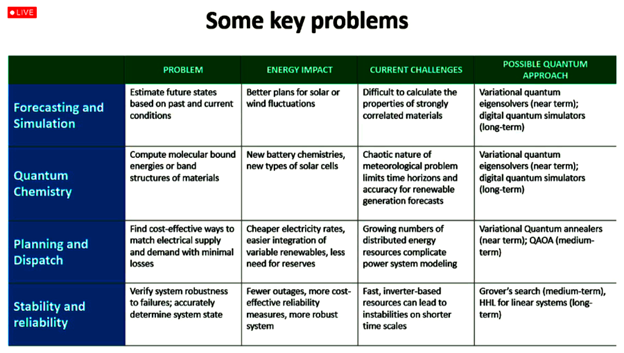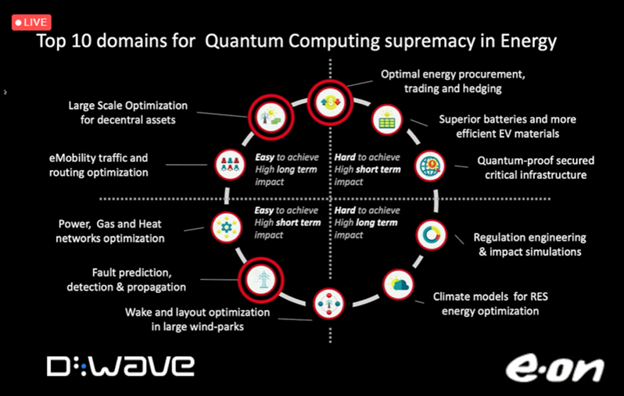
The energy needs of 10 billion inhabitants of the Earth cannot be best addressed with the tools available today. Optimizations unthinkable with both traditional computing and artificial intelligence can be achieved thanks to quantum computing, which includes technologies that are now ready for those who have adequate resources to take advantage of it. For eMobility management as well as we will see later. But first some basic concepts to understand what we are talking about.
Between wrong solutions and potential alternatives
High-performance and low-energy materials with equally high-performance assemblies in a world that collects much more energy and routes it with extraordinary agility, without wasting it, could easily have an efficiency up to ten times the current one. Science fiction? No, quantum computing.
Somehow the same situation could be true for electricity management in most of the contexts of the energy transition we are experiencing: the solution is information technology, but not in classical terms, rather with the weapons of quantum computing.
What is quantum computing and what does it have to do with energy?
In a nutshell, quantum computing is the framework term used to describe a series of technologies that exploit the basic properties of matter to solve problems in restricted areas, starting from points of view different from those of classical computer processing. These technologies are not of general use nor have easy to accept costs or availability, but they are expanding their capacity both technology by technology, hybridizing both with traditional architectures and between different quantum architectures. And the areas of application are rapidly expanding.
Just in these days D-Wave presented its hybrid solution that combines two approaches, Annealing (in which it is already a leader) and Gate (where it is starting to try its hand). A summary of the announcements is available here (in Italian). The cases of effective use of this new technology are constantly increasing in business sectors such as finance, robotics, logistics (energy, routes and wireless networks). It also benefits companies from production sectors linked to materials’ science: drugs, batteries, photovoltaic cells, chips and many others.
The advantages for energy optimization and its routing, in the science of materials and related devices, promises to redesign everything we know – and above all we do not know – about the future of energy on Earth. Unfortunately, bad scientific information is generally lost in unsuitable descriptions or science fiction comparisons that distance the general public from these topics, certainly difficult to disclose both in writing and on video (the contributions are in Italian).
Artificial intelligence and energy expenditure
Recently we have been led to think that artificial intelligence will solve all the optimization problems of existing processes. AI is making a great contribution in various fields, particularly in the reorganization of processes, but nothing scientific suggests that it will be a universal solution in the short term. In this positive climate, we often overlook its limits. One problem is the enormous energy expenditure of this approach. An example is the GPT-3, a very powerful artificial intelligence that is used to automatically synthesize texts in human quality, whose training requires the same energy needed by a city or many other energy-intensive situations, as various researchers are calculating. For some categories of problems, however, there is an alternative already feasible. The problems that can be reset as a list of constraints, for example, find in quantum computing – in short QC – an extremely efficient approach that solves even very complex optimizations in a few seconds.

The question may arise that the QC requires even more energy than the AI with which it is confronted for solutions. It is not so.
The electrical consumption of quantum processors, or QPUs, is declared by D-Wave laughable, equal to about 1% of traditional supercomputers and GPUs. We remind you that we are talking about devices in the price range of 10 million dollars for the purchase alone, plus a series of additional expenses and services, so their use requires careful planning of use (with preliminary simulations) and load (possibly to be shared among several realities).
10 energies where the quantum is decisive
QC offers an unprecedented opportunity to accelerate the energy transition. Much of the calculations we make for the efficiency of materials, systems and algorithms rest on an approach that QC can often unhinge, turning years into seconds. In particular, E.on presents a list of the ten points on which the QC can overturn the approach to energy.

The energy problems that can be faced with the QC
Among them, routing policies for e-mobility are easy to calculate and will have a long-term impact. Battery yield and energy trading, optimization of transmission networks and many other fluid dynamics problems, unsolvable with traditional computing, seem to be made especially for QC. A more exact weather forecast, as well as a more precise calculation of the interaction between wind and blades, can greatly increase the overall yield of various clean energy systems.
Even for the scheme of use, however, the traditional point of view deceives us. “It will be late if we don’t use it right away,” says Juan Bernabé-Moreno, Eon’s Cdo and speaker at the D-Wave conference, regardless of affordability or technology maturity issues. These are just some of the promises of quantum computing already available on the market today. The future promises even more electrifying crossovers of knowledge, such as quantum artificial intelligence.
We just have to wait. Hopefully not for long!
Source: greenstart.it